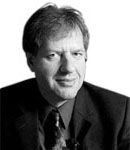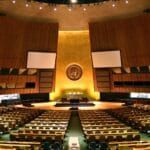An appreciation: The Republican senator who opposed nuclear arms
By Hugh Gusterson | August 10, 2011
“If you’ve been in a war, you cannot but have your views altered. The devastation, the terrible devastation, is not something one ever forgets.”
– Mark Hatfield, 1986
Oregon’s Mark Hatfield, who died on August 7 at the age of 89, was the kind of maverick Republican one no longer finds in the US Senate. While he supported loggers against environmentalists and opposed abortion, he also had an extraordinary record of courage and conscience on military issues that would have cost a lesser politician, especially a Republican, his career. As governor of Oregon, he was called a traitor for coming out against the Vietnam War in 1965 — long before most Americans knew how to find Vietnam on a map — and as a US senator he joined his liberal Democratic colleague, George McGovern, in sponsoring a measure (defeated) to bring US troops home from Vietnam. He was also, along with Senator Chuck Grassley, a Republican from Iowa, one of two Republican senators to vote against the 1991 Gulf War.
But it was opposition to the nuclear arms race that most defined Hatfield. As a young man he served in World War II, fighting in the battles of Iwo Jima and Okinawa, after which he was one of the first Americans to visit Hiroshima. Given the way Hiroshima changed him, it is ironic that he died the day after the 66th anniversary of the Hiroshima bombing. He described his experience at Hiroshima to the journalist Tom Brokaw in the following terms:
“I was part of a crew of people that went into Hiroshima. This was about a month after the bomb had been dropped. There was a smell to the city — and total silence. It was amazing to see the utter and indiscriminate devastation in every direction, and to think how one bomb had done it. We had no comprehension of the power of the bomb until then. When we landed, the little kids saw we weren’t going to kill or shoot them (they had been watched warily by some parents and kids) so they began to gather around. We realized they were very hungry, so we took our lunches, broke them up, and gave them to as many kids as we could. You learn to hate with a passion in wartime … but, sharing those sandwiches with the people who had been my enemy was sort of a therapy for me. I could almost feel my hate leaving me. It was almost a spiritual experience.”
Later, in a 1989 Congressional debate on the defense budget, Hatfield would read from John Hersey’s book Hiroshima. He read the story of a survivor who was trying to rescue about 20 others in his boat. “He drove the boat onto the bank and urged them to get aboard. They did not move and he realized they were too weak to lift themselves. He reached down and took a woman by the hands, but her skin slipped off in huge, glovelike pieces.”
Mark Hatfield is best remembered by arms control advocates for co-sponsoring the nuclear freeze resolution in 1982 with Democratic Senator Ted Kennedy. The two also co-authored a book, Freeze!, advocating an end to the nuclear arms race. At that time Hatfield told the Christian Science Monitor, “there is to me a direct ratio between the increase of our arsenals and the diminishing sense of national security.” He added, with a direct allusion to the gospels that sprang from his understated but deep faith as a Baptist, “There comes a time in a nation’s life when additional money spent for rockets and bombs, far from strengthening national security, will actually weaken national security — when there are people who are hungry and not fed, people who are cold and not clothed.”
Just as Hatfield was right, but ahead of his time, about Vietnam, so he was right, but ahead of his time, about a nuclear freeze — an idea seen as dangerously radical by many at the time that has now been absorbed into the architecture of our international system.
Although you would not know this from reading the obituaries in the Washington Post and the New York Times, this was far from the end of Hatfield’s dogged crusade against the arms race. Not mentioned in these obituaries is perhaps the greatest legislative achievement of Hatfield’s career — the 1992 measure that bears his name: the Exon-Hatfield-Mitchell Amendment to the Energy and Water budget authorization, which effectively ended nuclear testing. Following the end of the Cold War, Hatfield had been working with Senator George Mitchell, a Democrat from Maine, on a measure to end nuclear testing, but had been warned that President George H.W. Bush would veto it even if he could get it through the Senate. Hatfield and Mitchell teamed up with the more conservative Senator James Exon, a Democrat from Nebraska, who hit on the formula of allowing a limited number of nuclear tests to improve the safety and reliability of the stockpile before a permanent test ban. The point of allowing this fixed number of nuclear tests was to take away from the White House the argument against a test ban that it would compromise the safety and reliability of the US stockpile.
The Exon-Hatfield-Mitchell Amendment passed the Senate and was originally attached to the defense authorization bill. Democratic Senator Sam Nunn, the chair of the Senate Armed Services Committee, was at that time no friend of a test ban and, as the key senator in the House-Senate conference committee, he promptly axed the amendment. Hatfield shrewdly foresaw this and had the amendment duplicated on the Energy and Water authorization bill for which he served as the senior Republican on the conference committee, where he was able to protect it. President Bush later said it was the piece of legislation he most regretted having signed during his presidency, but sign it he did on October 2, 1992, and the United States has not tested a nuclear weapon since. (The limited series of nuclear tests it authorized were, in the end, determined to be unnecessary by the Clinton administration.)
The two co-sponsors of the Nuclear Freeze in the Senate, Mark Hatfield and Ted Kennedy, have died in the past two years. Where are the senators who will take their place as men or women of conscience able to articulate for the nation the perils of the idolatry of war?
Together, we make the world safer.
The Bulletin elevates expert voices above the noise. But as an independent nonprofit organization, our operations depend on the support of readers like you. Help us continue to deliver quality journalism that holds leaders accountable. Your support of our work at any level is important. In return, we promise our coverage will be understandable, influential, vigilant, solution-oriented, and fair-minded. Together we can make a difference.
Topics: Columnists, Nuclear Weapons















